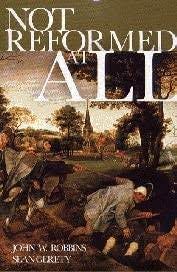Not Reformed at All: Medievalism in "Reformed" Churches
John Robbins and Sean Gerety (Unicoi: The Trinity Foundation, 2004)
In recent days, Doug Wilson has come under scrutiny yet again for his theology and behavior. Truths about Wilson’s heterodoxy have once again been published and, unsurprisingly, have been met with the insinuation that his critics are idiots, ungodly, ignorant, or leftists. Those of us familiar with Wilson anticipated this kind of insubstantial response. Sadly, however, many Christians who don’t know what the Federal Vision is, why it is heretical, and why it is that we oppose Wilson and the Federal Vision. They don’t hear anything that sounds unorthodox coming from him, but see him as an ally against the cultural enemies of the Church today. So Wilson’s response was taken as substantial, when it actually was not, and Wilson’s perceived orthodoxy got the stamp of approval — even without that orthodoxy actually being verified.
This is bad, of course. However, there is good that has come from this recent attempt to warn people about Wilson. In a word, it has pushed those who are willing to find the truth to do research, to learn for themselves, and to no longer lean on Wilson’s thin, prolix, and circuitous responses riddled with punches that don’t land. There are people looking for information on Wilson’s theology that is black and white, and this is very good. But it’s hard to come by for those just now embarking on the journey. So where can they go?
In Not Reformed at All: Medievalism in “Reformed” Churches, John Robbins and Sean Gerety clearly explain the problems with Wilson’s theology. Robbins and Gerety demonstrate the rhetorical tactics Wilson uses to defend himself (in his book Reformed is Not Enough) against individuals and groups in orthodox Presbyterian Reformed denominations who had become vocal in their opposition to what at that time was called the Auburn Avenue theology. They also give the reader unfamiliar with Presbyterian history in America a short genealogy of the Federal Vision movement, in order to help him grasp the larger philosophical and theological debates happening at the time of Wilson and colleagues’ formation of Federal Vision theology.
Wilson’s sophistical reasoning and rhetorical tricks are listed and, over the course of the book, demonstrated by citations of Wilson’s writing which engages with Scripture incorrectly and deceitfully, makes bold assertions that demand Scriptural support which he does not (because he cannot) provide, ignores Scripture that would undermine his claims, argues fallaciously, is often self-contradictory, and redefines language in order to make his position appear in a better light. They write —
Wilson redefines basic Christian terms, and one of the terms he redefines is “Christian.” He uses the word in the same way that people who cannot tell the difference between Protestantism, Romanism, and Liberalism use the word: inaccurately and equivocally. Just as infants call every adult male they see “Daddy,” Wilson calls every baptized man he sees “Christian.” Wilson even has the audacity to argue that this infantile meaning is the “New Testament sense” (14). He writes: “This question [what is a Christian?] is one of the most important questions a man can ask himself. Tied in with it are all the related questions about God, man, sin, salvation, and revelation”...Wilson lets us know that by redefining this word, he is simultaneously re-structuring all doctrines.1
Robbins and Gerety’s point here helps the reader to make sense of why it is that Wilson can sound orthodox but yet have 20+ year history of godly and intellectually gifted men testifying to the contrary.
While the book is polemical in tone, the assertions made by the authors are rationally justified. There are strong words about Wilson and his fellow Federal Visionists, in other words, but they are not like the taunting jests of Wilson toward his critics — they have actual substance. Given our times, men getting straight to the point as clearly as they can is needed, not false humility and deference parading itself around as “Christian virtue.” There are not merely “some” problems with FV theology, it is foundationally corrupt. This is what Not Reformed at All sets out to demonstrate from Wilson’s own writing, and it is what it accomplishes in just under 200 pages.
—h.
P.S. — I will be doing a podcast on the subject of Federal Vision theology this Friday, for any who would some preparation material on the subject.
Emphasis mine.



